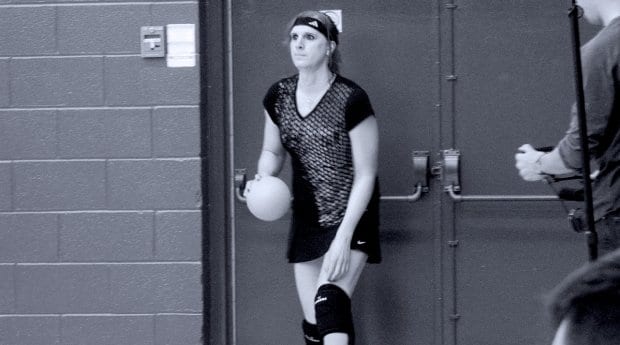“Savannah’s got a badass throw!” an observer exclaims as a ball comes whipping through the air. The impact against the wall is even louder.
Savannah Burton does have a badass throw, and she should — it’s the result of over seven years of playing dodgeball. And it’s paid off big, because she’ll be representing Canada at the World Dodgeball Championships in Las Vegas in August 2015.
It’s not her first crack at this tournament. In 2012, she represented Canada in Malaysia — as a member of the men’s team. Now on the women’s team, she has become the first trans athlete to be part of a Canadian national dodgeball team.
But it almost didn’t happen.
“I wasn’t sure if I was ever going to come back and play dodgeball,” Burton says.
In May 2013, she stopped playing dodgeball to focus on her transition. She left the sport for 16 months. “I just had to step away from everything,” she says.
When she was ready to return, she wasn’t sure how she would be received. Her first hurdle: finding out the Canadian Dodgeball Association’s (CDA) stance on the matter.
Bethel Lascano, vice president of communications and media for the CDA, confirms that Burton did inquire with the association’s president about her chances. From there, the next step was to find out if the World Dodgeball Federation (WDBF), the international governing body for dodgeball, allowed for trans athletes to compete.
It turns out that legal documentation recognizing Burton as female was the only requirement for her tryout. She had it.
The WDBF’s guidelines are quite slack when compared with those from the International Olympic Committee (IOC). In 2004, the IOC introduced a policy for trans athletes — it outlines that they must have legal recognition of their assigned sex, have received hormone therapy “for long enough to minimize any gender-related advantages” and have lived at least two years in their newly assigned gender after sex-reassignment surgery. Many sports have adopted this policy.
“I have a real problem with the IOC’s guidelines,” Burton says. “If they have the surgery it doesn’t change their abilities whatsoever, so why is that a requirement?”
Fortunately for her, it was a non-issue for the CDA.
“Once we got the okay from the WDBF, we as a committee, we all voted on our stance and it was unanimous that we would allow any transgender individual to apply and try out for the team,” Lascano says.
“They have been really supportive of me playing,” Burton says. In fact, every reaction has been positive so far – especially from her teammates.
“I’m really happy that Savannah came back to dodgeball,” says teammate Shauna Roe. Roe adds that she’s never heard anyone claim Burton has an unfair advantage or that they feel uncomfortable playing with or against her. “People have been really accepting I think, and really supportive,” she says.
But is there anything to be said about an unfair advantage? Burton scoffs at the idea.
“After two years on HRT [hormone replacement therapy], basically you’re on the same level as cisgender women,” she says, having pointed out that she’s been on HRT and testosterone blocks for close to three years. “I probably have less testosterone in my body than anyone else on the team.”
“She’s just another member of the team,” Lascano says. “There are other women who play just as strong as her on the team and they all play their different role.”
“We went by the best possible team that we could possibly select,” she affirms. “Savannah had the tryout of her life and she was noticeable.” Anyone who had ambitions of being on the team would have had to do the same, she adds.
That’s exactly how Burton wanted to be treated, and it’s the message she hopes comes across. “I want to put it out there that I’m just like anybody else,” she says.
The Canadian women’s dodgeball team is currently fundraising to cover costs and looking for corporate sponsorship. If you would like to support the team, contact Steve Hickson at steve.hickson@canadiandodgeball.ca and visit www.canadiandodgeball.ca to find out more.


 Why you can trust Xtra
Why you can trust Xtra


